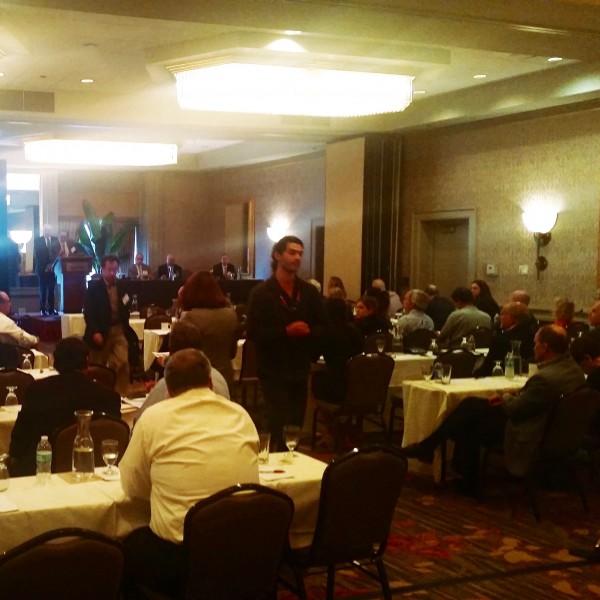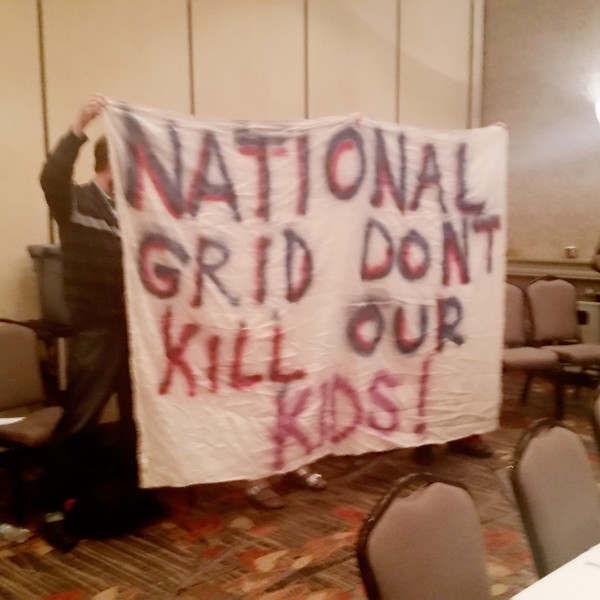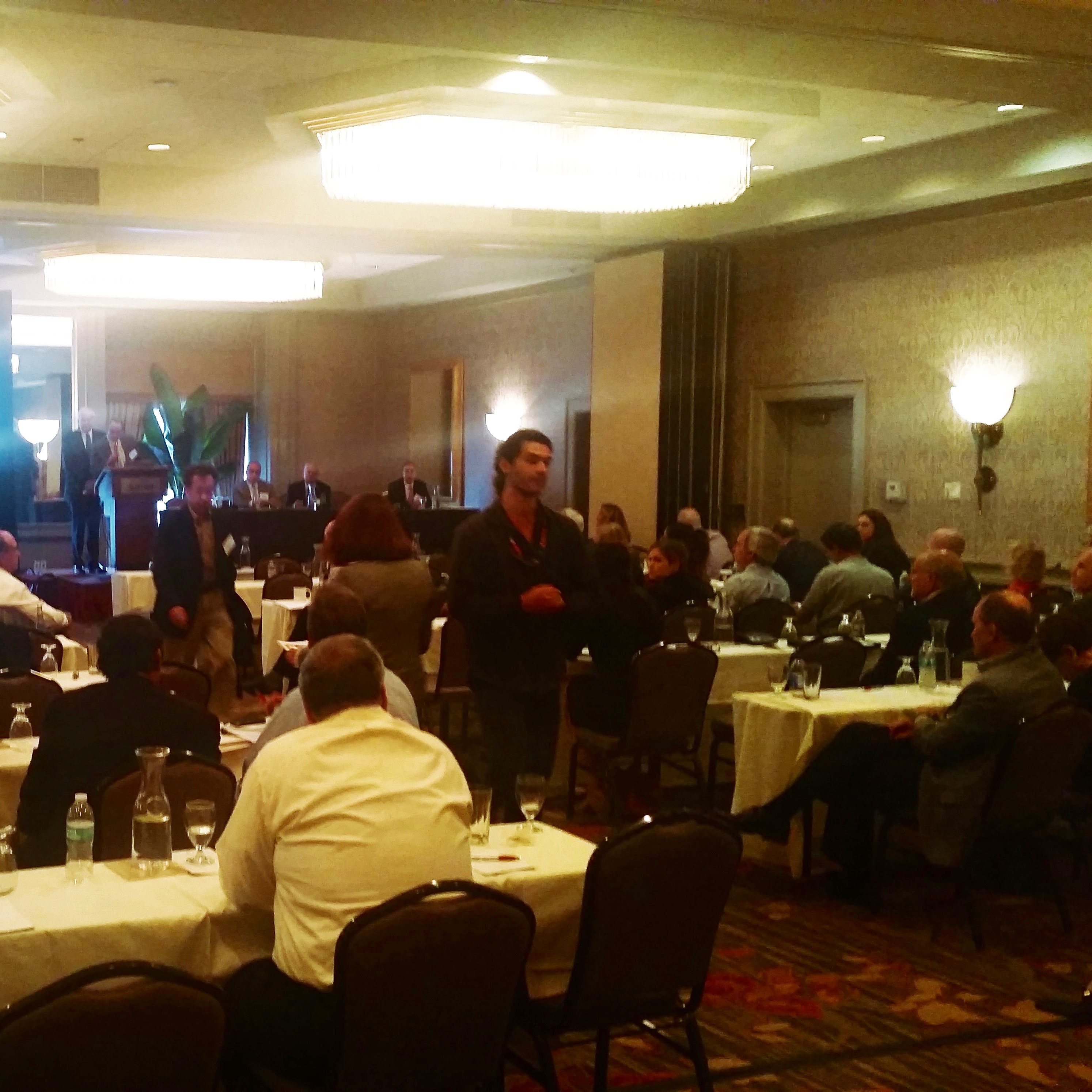 The Consumer Liaison Group (CLG) Meeting happens four times a year and its a chance for ISO-NE to exchange information with electricity consumers in New England. ISO-NE is the group that regulates our electricity markets and keeps the lights on by coordinating electricity generation and transmission. They run billion dollar markets and interact with companies like Spectra Energy, Invenergy, National Grid and Deepwater Wind. Pretty much every aspect of the process of getting electricity to your television is touched upon by ISO-NE in some way.
The Consumer Liaison Group (CLG) Meeting happens four times a year and its a chance for ISO-NE to exchange information with electricity consumers in New England. ISO-NE is the group that regulates our electricity markets and keeps the lights on by coordinating electricity generation and transmission. They run billion dollar markets and interact with companies like Spectra Energy, Invenergy, National Grid and Deepwater Wind. Pretty much every aspect of the process of getting electricity to your television is touched upon by ISO-NE in some way.
 The latest meeting of the CLG, in Providence on Thursday, featured a panel discussion with representatives from the four companies mentioned above. The panel was pulled together with the help of Douglas Gablinske, executive director of The Energy Council of Rhode Island (TEC-RI) an advocacy group for energy company concerns. Readers of RI Future may remember that Gablinske was a vocal opponent of Cale Keable’s bill to reform the Energy Facilities Siting Board (EFSB). He was also the only speaker at the RI Public Utilities Commission (RIPUC) to speak in favor of the pipeline tariff.
The latest meeting of the CLG, in Providence on Thursday, featured a panel discussion with representatives from the four companies mentioned above. The panel was pulled together with the help of Douglas Gablinske, executive director of The Energy Council of Rhode Island (TEC-RI) an advocacy group for energy company concerns. Readers of RI Future may remember that Gablinske was a vocal opponent of Cale Keable’s bill to reform the Energy Facilities Siting Board (EFSB). He was also the only speaker at the RI Public Utilities Commission (RIPUC) to speak in favor of the pipeline tariff.
Gablinske surprised me by asking if I knew about any planned protests or disruptions. I said I didn’t. He asked me specifically about the FANG Collective. I had no idea of what plans they have, if any, I said. Then Gablinske said that he noticed Mary Pendergast on the list of people who had signed up to attend. Pendergast was sitting in the room, and he soon went over to introduce himself to her.

During the course of the presentation there was a disruption. As Invenergy’s John Niland gave his presentation to the room, Mary Pendergast stood and display a small sign that said, “No fracked gas Power plant.” Her protest was silent but it did seem to throw Niland off a bit, as his delivery seemed somewhat distracted.
It was during the third presentation that the disruptions became more pronounced. As Richard Kruse, vice president at Spectra Energy spoke glowingly about the need for bigger and better pipelines in our fracked gas infrastructure future, Kathy Martley of BASE (Burrillville Against Spectra Expansion), Keith Clougherty of the FANG Collective and Sally Mendzela stood up.
“Spectra Energy, Energy for Death,” said Martley as I headed for my camera. “Say no to Invenergy and tell Invenergy to go home,” Martley continued.
As the protest continued, Gablinske took the podium and said, “You have a right to be here but not be disruptive” as Clougherty continued to speak.
Lennette Boiselle, an ally of Geblinske and a lobbyist for the Northern Rhode Island Chamber of Commerce got up and left the room, presumably in search of security. Readers might remember Boiselle as the person arguing against democracy at the public comment hearing concerning Cale Keable’s EFSB bill.
“The political correctness, of not allowing other people to talk is sweeping through this country,” said Geblinske, “It’s an incorrect assumption, this gentlemen has the right to speak…”
“We’ve been listening to you our whole lives, Pal,” interrupted Sally Mendzela.
Gablinske ultimately offered to set up a forum where “both sides” could be heard but it is unknown if this will actually happen. The protesters took their seats, no one was ejected from the forum, and Kruse finished his talk.
Amazingly, though, that wasn’t the end. During a brief question and answer period at the end of the presentations, Gablinske called on Clougherty to ask a question!
“I would ask for a question, not a speech or a statement,” said Gablinske, when he realized who he had called upon.
Clougherty then asked Niland, Kruse and Bill Malee, a National Grid VP, “Do your companies have any money set aside for restitution for the millions of people who are going to be displaced and killed by the infrastructure projects you all are proposing?”
There is no good answer representatives from these companies can give, yet Niland attempted one. As expected, it was not good.
I found the most interesting talk of the day came from Mary Louise “Weezie” Nuara, External Affairs Representative for ISO-NE.
“The region’s competitive wholesale electricity markets are really designed to maintain reliability through the selection of the most economically efficient set of resources,” said Nuara, but the states “have environmental and renewable energy goals that are beyond the objectives of the wholesale electricity markets.”
What’s happening is that states are setting goals to increase renewables and reduce greenhouse gas emissions (like the goals set out in ResilientRI, but all the New England states have some version of this idea.) ISO-NE is designed to deliver energy as reliably and cheaply as possible. As a market, it cannot deliver renewables or reduce emissions unless those options are cheaper and cleaner. In August, NEPOOL (which represents the interest of the New England states when dealing with ISO-NE) began looking into how to adjust wholesale electricity markets to accommodate the goals of the states. It is NEPOOL’s goal to develop a “framework document” by December 2 to provide guidance to ISO-NE regarding potential changes. (A kind of advisory opinion, if you will.)
What makes this interesting, to my mind, is that if ISO-NE starts taking the climate change concerns of the states into account, plants like the one Invenergy is planning for Burrillville will have a harder time selling their energy into the markets.
ISO-NE is a little over a decade old, but already it’s finding that its systems are in need of being updated over concerns of climate change. By contrast, the EFSB here in Rhode Island was established thirty years ago, in 1986. The RI General Assembly has shown little inclination towards revising the EFSB’s mandate in lieu of climate change.
Below please find all the video from the CLg meeting except for the closing comments.
Rebecca Tepper, chair of the CLG Coordinating Committee and chief of the Energy & Telecommunications Division of the Massachusetts Attorney General’s office introduced keynote speaker Rhode Island General Treasurer Seth Magaziner.
Douglas Gablinske, executive director, The Energy Council of Rhode Island
Jeffrey Grybowski, chief executive officer, Deepwater Wind
John Niland, director of business development, Invenergy
Richard Kruse, vice president and regulatory & FERC compliance officer for Spectra Energy
Bill Malee, vice president of regulatory affairs, for National Grid
ISO-NE Q&A


